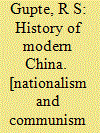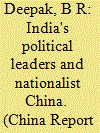| Srl | Item |
| 1 |
ID:
043447


|
|
|
|
|
| Publication |
New Delhi, Sterling Publishers, 1974.
|
| Description |
670p.hbk
|
|
|
|
|
|
|
|
|
|
|
|
Copies: C:1/I:0,R:0,Q:0
Circulation
| Accession# | Call# | Current Location | Status | Policy | Location |
| 014052 | 951.05/GUP 014052 | Main | On Shelf | General | |
|
|
|
|
| 2 |
ID:
133738


|
|
|
|
|
| Publication |
2014.
|
| Summary/Abstract |
This article discusses how, owing to the commonalities in thoughts and actions of Indian and Chinese nationalists, they forged close ties not only at the individual, but also at the organizational, levels. It posits that while the early Indian nationalists sought to pursue the path of armed struggle to dislodge the British from India, in the second phase leaders of the Indian National Congress (INC) sought to establish links with the Kuomintang (KMT), the ruling party in China. The Indian leadership, especially Nehru, was of the view that there was much in common in the struggle carried out in different colonial countries, including the unification drive in China in the 1920s, and that therefore there was a need to forge close ties to support each other's struggles. It was this thinking of Nehru and others national leaders including Gandhi that culminated in Nehru's China visit in 1939 and Chiang Kai-shek's India visit in 1942, although Chiang's prime objective was to muster India's support for the Allied war effort. The quest for alliance with China did not die out even after the Chinese Revolution; however, developments that unfolded thereafter led in a different direction.
|
|
|
|
|
|
|
|
|
|
|
|
|
|
|
|
| 3 |
ID:
133476


|
|
|
|
|
| Publication |
2014.
|
| Summary/Abstract |
What is the origin of the norm that international institutions should support the economic development of poorer countries? It is commonly argued that the norm of international development was pioneered by US president Harry S. Truman in a famous 1949 speech as a means of serving US economic goals in the early Cold War. But this norm in fact emerged much earlier from Sun Yat-sen's thinking in China in 1918 and after that from Latin American preferences in the inter-American context of the 1930s. The latter were particularly influential in encouraging US officials to design, in the early 1940s, the first international institution with a strong development mandate: the International Bank for Reconstruction and Development. During the negotiations leading up to the 1944 Bretton Woods agreements, Latin American policymakers supported and reinforced the US plans, as did representatives of China, India, and Eastern Europe. For officials from these countries and regions, international development promised support for their increasingly ambitious domestic development goals while minimizing the costs that had often been associated with private international investments in the past.
|
|
|
|
|
|
|
|
|
|
|
|
|
|
|
|